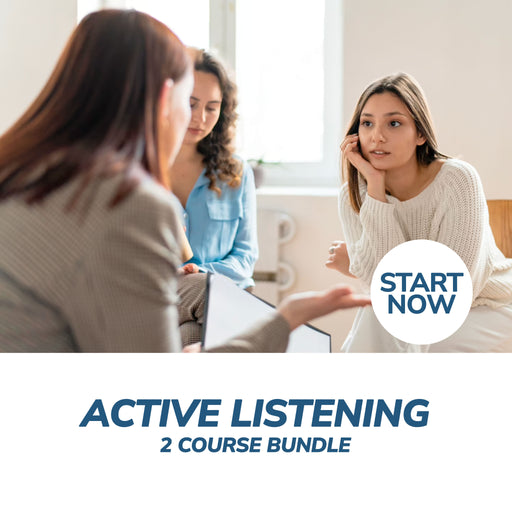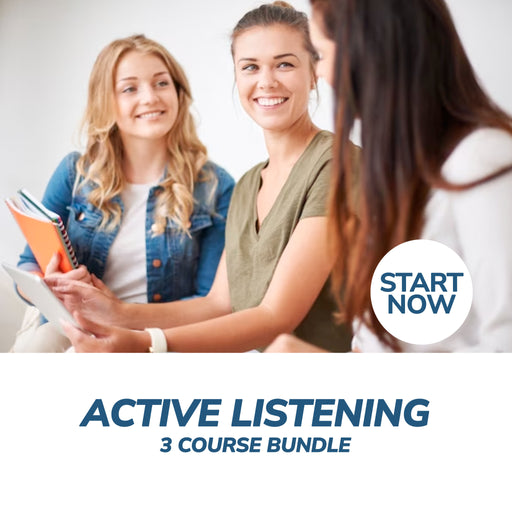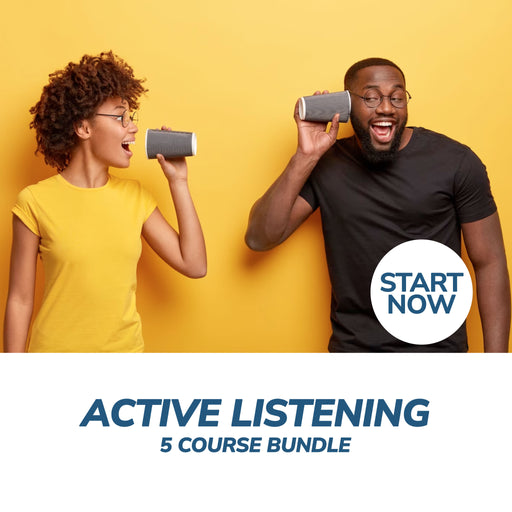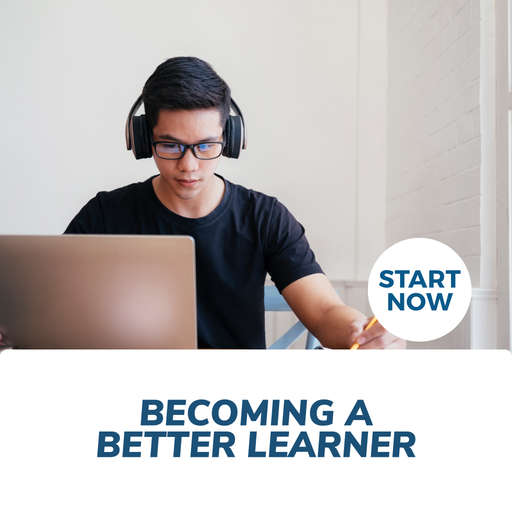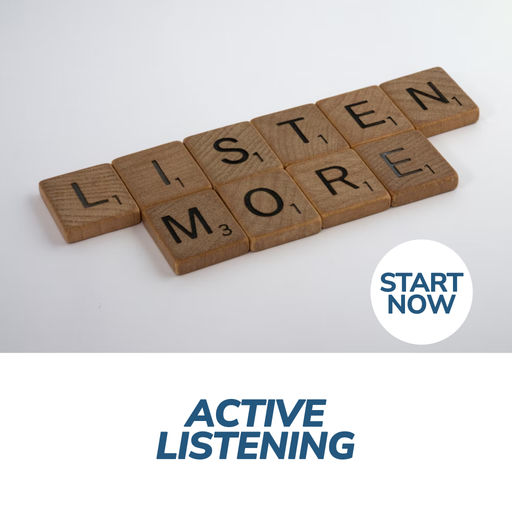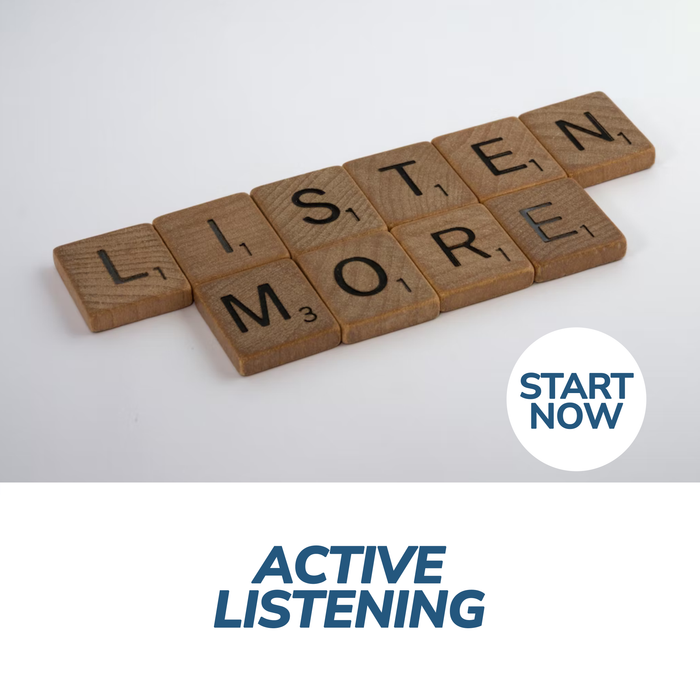
About This Course
What you will learn
|
|
Study Active Listening Online Course; Learn the basics of Active Listening and become an effective communicator
Active listening is one of the most important communication skills you can have. It can have a major influence in helping you get ahead in your career and the quality of your personal relationships. Our Active Listening Certification will help you develop this skill with a little bit of patience and practice.
Communication skills are at the heart of everything we do each day, whether at home, at work, or at play. The Active Listening Certification focuses on active listening, which represents the best of communication.
Our Active Listening Certification provides people with the listening skills to respond, interact, and communicate effectively with others. With this active listening online course, people can genuinely communicate by helping them understand the importance of probing and questioning. The course enhances active listening skills by defining what is a positive attitude, introducing the basics of neuro-linguistic programming for increasing the ability to listen, and using these skills in a variety of situations.
By assessing your listening skills through this course, you’ll find out where you might be going wrong and what you can do to engage in active conversations. This in turn will increase your productivity and enhance your own learning experience, and that of those around you.
At Courses For Success, our active listening training course has been carefully developed by leading professionals and validated by industry experts to guarantee you are getting the most up-to-date experience. By enrolling in this active listening training, you can be confident you are getting the best leadership essentials.
Active Listening Online Course- Requirements
This online class is not a master degree, but is designed for people who want to acquire active listening skills to become better learners and communicate with others more effectively. It’s based on data science and is delivered 100 percent online 24/7 and only takes 3 to 6 hours of study to complete.
To successfully complete this course, a student must:
Have access to the internet and the necessary technical skills to navigate the online learning resources
Have access to any mobile device with internet connectivity (laptop, desktop, tablet)
Be a self-directed learner
Possess sound language and literacy skills
Quick Course Facts
Course content is structured for easy comprehension
Approximately 3 to 6 hours of study is needed to complete the course
Registered students gain unrestricted lifetime access to the Active Listening Online Certificate Course
All course material is available online 24/7 and can be accessed using any device
Study online from anywhere in your own time at your own pace
All students who complete the course will be awarded with a certificate of completion
If you have any questions about our effective listening online training, get in touch with our expert consultants or view our frequently asked questions below.
Active Listening Online Course Outline
Session 1: Course Overview
Communication skills are essential in our day to day life. This is how we interact with each other, whether at home, work, or play. Active listening is more than listening or hearing. It gives people the ability to communicate genuinely by letting each party know the message in each word or sentence.
Active listening, also known as mindful listening, and it's essentially all about paying attention to those who are speaking around you. Whether you're in a workplace or in everyday life, great listening techniques are crucial to personal success and professional development.
Active listening also encourages better communication by letting the listener formulate questions, probe for better speaker-listener interaction.
Session 2: Defining Active Listening
Active listening is a communication skill that not only helps you listen better but more importantly focuses on the message being communicated. This discipline includes being able to respond to content, identify feelings present, and encourage the exchange of ideas through proper probing and questioning.
Reading Cues
Active listening skills involve being able to identify non-verbal aspects of the conversation. Active listeners must be able to adjust their listening approaches accordingly. It doesn't take much, stepping back or leaning towards the speaker can go a long way in improving the quality of conversation. Things to look out for include:
Checking the speaker’s facial expressions, gestures, and posture
The speaker's voice is it monotonous, loud, or shaky
Listen to certain points that a speaker is stressing or giving special importance
Check if the speaker is mumbling or having difficulty conveying their message
Check the speaker’s body language which can indicate nervousness or stress
Improve your listening skills by identifying the importance of a positive listening attitude, learning the basics of neuro-linguistic programming, evaluating a variety of situations, and learning to respond accordingly.
Quick tips on becoming a better active listener:
Make a decision to listen
Don’t interrupt people
Keep your eyes focused on the speaker and your ears tuned to their voice
Ask the other person what they want from the conversation
Ask a few questions throughout the conversation
Set an example, practice active listening skills
Session 3: Body Language Basics
In this part of the active listening online course, we discuss body language basics and how it can support or become a barrier to communication. We also explain how body language can help us understand what others are trying to communicate and how it affects active listening.
Examples of positive body language
Listener leaning towards the speaker
Focusing on the speaker through appropriate levels of eye contact
Body fully facing the speaker and not turned away
Barriers to communication
Rolling eyes
Constantly being distracted by constantly checking the phone
Turning the body away from the speaker
Fingers and feet constantly fidgeting indicate impatience
Session 4: Attitude is Everything!
Communication is a two-way street and having a positive mindset makes it easier to facilitate the flow of ideas between parties. Pretending to be listening only wastes time, both for the speaker and listener. Closing your mind to new ideas and attacking the speaker personally only ruins the conversation.
In this active listening online course, we will help you develop key attitudes that can help develop your active listening skills and become a more objective listener. You will learn key learning elements of listening, including empathy, sympathy, positive intent, the frame of reference, reframing, and genuine communication.
Under this session, we will learn about:
Understanding sympathy and empathy
Demonstrating empathy
Creating the right mindset
Reframing the situation
Establishing positive intent
Maintaining focus
Being genuine
Considering your purpose
Making connections
Constructing your response
Demonstrating Empathy
Empathy shows respect and understanding of the other's feelings. This shows a level of objectivity compared to sympathy, which leans towards feeling strong emotions. Empathy is placing yourself in the other person's shoes. Empathy can be displayed by:
Practicing good listening skills by focusing on the person currently speaking
Use open questions rather than closed questions or statements
Agreeing if appropriate
Trying to understand where they are coming from
Assuring them of your support
Encouraging them if appropriate
Avoid saying “I know how you feel”
Session 5: Encouraging Conversation
Encouraging interaction improves the flow of ideas between speaker and listener. It also communicates to the speaker that the audience is listening. It prevents misunderstanding by letting the listener clarify unclear points through questions, probing, and paraphrasing.
The Communication Process -Misunderstanding results from listeners failing to comprehend the real meaning of a speaker's messages. This can be influenced by several factors, including speaker and listener biases.
Speaker’s Biases:
Body languages
Tone of voice
Words
Expressions
Listener’s Biases
Past experiences
Maps of reality
Education
Assumptions
Emotional state
Distractions
Paraphrasing ensures that you completely and accurately understand the message the speaker is sending. Paraphrasing is not parroting; it involves a level of analyzing. To paraphrase well, here are some tips:
Paraphrase only when necessary, clarify or confirm a point
Formulate the statement in your own words
Use appropriate questions like. “Do you mean” or “Is it correct”
Don’t include personal opinions, conclusions, or make judgment statements
Refrain from making judgments, injecting your own thoughts, and offering your opinion
Session 6: Building Relationships
Whether it's a student-teacher relationship or conversation between friends, building relationships makes communication more meaningful. By establishing a relationship, ideas can be easily exchanged because there is a level of trust between parties. A listener, for example, can express concerns more freely and be more open to new ideas.
This part of the active listening online course helps you create better relationships by introducing concepts such as building rapport and finding common ground. You will also learn about neuro linguistic programming and how it contributes to building more meaningful relationships.
Building common ground
Mutual trust, respect, and understanding are the foundations of a meaningful conversation. Rapport is defined as a sense of mutual understanding and friendliness. It is a relationship based on trust and authenticity. This does not only show the other person that you are actively listening but also respects them as a human being.
Finding common ground
Good communication skills should be practiced, whether you're a customer service representative or in a managerial position. Finding common ground to establish rapport is essential. A simple way of breaking the ice is with small talk. By sharing experience, you could bring this conversation to a more personal level.
Using humor
One way of bringing down tensions, especially in a highly formal setting is to inject humor into the conversation. Laughter is such a powerful emotion that it can help lighten the mood. However, this should not be personal or directed to any person in the group. If making jokes is not your cup of tea, better switch to another idea.
Neuro Linguistic Programming (NLP) concepts
The active listening online course gives you an overview of Neuro linguistic programming (NLP) and concepts that help listeners warmup to speakers and in the process, create better relationships. NLP works by letting us use body language not only to make an assumption but also lets us use these as ways of adjusting our listening behaviors to connect and understand others.
Associated or dissociated
This indicates if the person you are communicating with is engaged or somewhere else. People who signify they are engaged/associated are:
Lean forward
Show a lot of body gestures, animated and imagery
Exhibit emotions when communicating or interacting with others
People who are disengaged/disassociated are:
Lean backward or turn away
Are less open to new ideas and more objective
Towards or Away from:
These reflect a person’s state whether they are looking forward to something they want to achieve or moving away from a problem. In the Away From state, a person is usually tense and negative. In the Towards state, people generally tend to be relaxed and exhibit a positive body language.
Match/mismatch
Everybody has a natural tendency towards antagonism, co-operation, and friendliness. People who find themselves in their natural settings have an easier time building rapport. This is because they exhibit similar body language patterns with the people around them.
People who are in a mismatch state try to find faults in others and are antagonistic to others around them. They exhibit body language and speech patterns that are opposite to the person they are communicating with. People who are in this state use expressions such as:
At odds with
On the other hand
Devil’s advocate
Session 7: Getting Over Listening Roadblocks
In this session, we will discuss common barriers to effective communication. We will learn about the different factors that affect active listening and roadblocks. You will also be able to identify common communication barriers and how to overcome them.
How to Make Better Connections
Minimize distractions (place cell phones in silent mode and out of sight, face the speaker)
Immediately ask the speaker politely to repeat any points missed
Getting into the right mindset, avoid prejudging the speaker
Avoid unsolicited advice
Constructing open questions, summary questions, and paraphrasing
Session 8: A Personal Action Plan
This part of the active listening online course lets you put into action all the concepts of active listening. Creating a personal action plan helps keep you on track and focused. In this session, you will also learn to develop short-term and long-term goals. To start creating a personal action plan, follow these steps:
Starting point
Where I want to go
How I will get there
Further Learning
At CFS, we have a range of courses for personal development available that can help you with goal setting for any career into the future. You can work on leadership essentials and leadership skills, management skills, human resources and training management. We can even help you learn to become a web developer or simply enhance your soft skill training by studying Microsoft Office. Whatever you need, you’ll find it here with Courses for Success.
Recognition & Accreditation
Upon successful completion of this listening skills training course and achieving a passing score for the assessment, you will be issued with an international continuing education credit (CEU) certificate.
This Certificate is applicable worldwide, which demonstrates your commitment to learning new skills. You can share the certificate with your friends, relatives, co-workers, and potential employers. Also, include it in your resume/CV, professional social media profiles and job applications.
Units of Study
Session 1: Course Overview
- Learning Objectives
- Pre-Assignment
Session 2: Defining Active Listening
- What is Active Listening?
- Responding to Feelings
- Reading Cues
- Demonstrating Listening
- Identifying Good Listeners
- Tips for Becoming a Better Listener
- Pre-Assignment Review
Session 3: Body Language Basics
- Silent Messages
- Making Connections
Session 4: Attitude is Everything!
- Understanding Sympathy and Empathy
- Demonstrating Empathy
- Creating the Right Mindset
- Reframing the Situation
- Establishing Positive Intent
- Maintaining Focus
- Being Genuine
- Considering Your Purpose
- Making Connections
- Constructing Your Response
Session 5: Encouraging Conversation
- What Is Said and What Is Heard
- The Ladder of Inference, Part One
- The Ladder of Inference, Part Two
- The Ladder of Inference, Part Three
- The Ladder of Inference, Part Four
- Reflection: Using Your Own Experiences as a Resource
- Asking Questions, Part One
- Asking Questions, Part Two
- Probing Techniques, Part One
- Probing Techniques, Part Two
- Paraphrasing Techniques
- Echoing Techniques
Session 6: Building Relationships
- Building Common Ground
- Finding Common Ground
- Using Humor
- NLP Tips and Tricks
- Associated or Dissociated
- Towards or Away From
- Match/Mismatch
Session 7: Getting Over Listening Roadblocks
- Problems and Solutions
- Making Connections
Session 8: A Personal Action Plan
- Starting Point
- Where I Want to Go
- How I Will Get There
Requirements
Entry requirements
Students must have basic literacy and numeracy skills.
Minimum education
Open entry. Previous schooling and academic achievements are not required for entry into this course.
Computer requirements
Students will need access to a computer and the internet.
Minimum specifications for the computer are:
Windows:
Microsoft Windows XP, or laterModern and up to date Browser (Internet Explorer 8 or later, Firefox, Chrome, Safari)
MAC/iOS
OSX/iOS 6 or laterModern and up to date Browser (Firefox, Chrome, Safari)
All systems
Internet bandwidth of 1Mb or fasterFlash player or a browser with HTML5 video capabilities(Currently Internet Explorer 9, Firefox, Chrome, Safari)
Students will also need access the following applications:
Adobe Acrobat Reader
Requirements
Entry requirements:
Students must have basic literacy and numeracy skills.
Minimum education:
Open entry. Previous schooling and academic achievements are not required for entry into this course.
Device requirements:
Students will need access to a computer/any device and the internet.
FAQS
1. Who are Courses For Success?
Courses For Success is a course platform that started in 2008
with 5 courses, since then we have grown to over 10,000 online courses.
Our courses span across the following categories:
•Animal
•Beauty
•Business
•Health & Fitness
•Finance
•Lifestyle
•IT & Software
•Personal Development
•Teaching & Academics
2. Is there a refund/cancellation policy?
Yes, we have a 7-day money-back refund guarantee. Just send us an email to info@coursesforsuccess.com with the subject Courses For Success Refund so we can accommodate your request.
3. What is the FREE Personal Success Training Program?
The Personal Success Training Program
was developed by Courses For Success to help our customers achieve
success. Currently, we are offering this program for FREE with every
course or bundle purchase this month. This is a limited time offer!
4. Are there any requirements to study this course?
No,
anyone who has an interest in learning more about this subject matter
is encouraged to take our course. There are no entry requirements to
take this course.
5. Do I require to have finished high school to complete this course?
No,
you do not require a High School Diploma or to have finished school to
study this course, this course is open to anyone who would like to take
this course.
6. What if English is not my first language?
This
course is provided in English, however, due to the digital nature of
our training, you can take your time studying the material and make use
of tools such as google translate and Grammarly.
7. Is this course online or conducted in person?
All our courses are accessible online on any device. You may complete them at your own pace and at your own time.
8. How do I receive my course?
After
you have completed the payment, you will receive a confirmation email
and tax receipt. You will also receive an email containing your course
login details (username and password), as well as instructions on how to
access and log in to your course via the internet with any device,
please check your junk/spam folder in the event that you do not receive
the email.
9. When does this course start?
Providing
you have internet access you can start this course whenever you like,
just go to the login page and insert your username and password and you
can access the online material.
10. What is online learning like?
Online learning is easy, if not easier than a traditional academic situation.
By studying an online course, the usual boundaries caused by location and time constraints are eliminated, meaning you are free to study where and when you want at your own pace.
Of course, you will need to be able to self-manage your time and be organized, but with our help, you’ll soon find yourself settling into a comfortable rhythm of study.
11. What computer skills do I need for my course?
You
don't need to be a computer expert to succeed with our online training,
but you should be comfortable typing, using the internet and be capable
of using common software (such as Microsoft word).
12. How long will you have access to the online course?
The majority of our courses have unlimited lifetime access, meaning you can access this course whenever you want.
Please also check the course summary, as a small selection of courses have limited access.
13. How long will my course take?
Course duration, is listed under Course Summary
14. Do I need to buy textbooks?
All the required material for your course is included in the online system, you do not need to buy anything else.
15. Is the course interactive?
Yes, all our courses are interactive.
16. Is there an assessment or exam?
Yes,
you will be required to complete a multiple-choice test online at the
end of your course, you can do this test as many times as you require.
17. What type of certificate will I receive?
You
will receive a Certificate of Completion that is applicable worldwide,
which demonstrates your commitment to learning new skills. You can share
the certificate with your friends, relatives, co-workers and employers.
Also, include it in your resume/CV, professional social media profiles
and job applications.
Wendy Sue Hunt - 5 STAR REVIEW
"If you are considering taking any “Courses for Success”, I would highly recommend it. I have always been a firm believer it’s important to always sharpen your skills. You are never too old to learn more. I found the courses very helpful, interesting and easy to understand.
The term “Courses for Success” helped me in my current position to succeed. After completing the courses, I gave my manager the completion certificates. Recently I received a promotion too."
Valencia Marie Aviles - 5 STAR REVIEW
"I
had a very good experience with my course. It has helped me to get
multiple jobs and prepared me for almost everything I would need to
know. The course was very informative and easy to understand and broken
up perfectly to be done in a short amount of time while still learning a
good amount! I would recommend Courses for Success to anyone trying to
get abs certifications for job advancements, it is well worth it!"
ELENA GRIFFIN - 5 STAR REVIEW
"I have absolutely enjoyed the materials from Courses for Success. The materials are easy to understand which makes learning enjoyable. Courses for Success have great topics of interest which make you come back for
more.
Thank you Courses for Success for being part of my learning journey and making education affordable!"
Our
completion certificates are very valuable and will help you progress in
your work environment and show employers how committed you are to learn
new skills, you might even get a promotion.
18. Will this course be credited by universities?
No, it is not equivalent to a college or university credit.
19. Am I guaranteed to get a job with this certificate?
This course will give you the skills you need to help you obtain employment, but it’s up to you if you get the job or not.
20. How will this course assist me with my career?
Studying
and completing this course will show employers that you have the
knowledge in this field, additionally you will gain more confidence in
this area of expertise.
21. How long is the certificate valid for?
The Certificates are valid for life and do not need renewing.
22. Can I take more than one course at a time?
Courses
are studied online at your own pace and you are free to study as many
or as few courses as you wish, we also offer online course bundles that
allow you to save on additional courses so that you may get all the
topics related to your training goals in one go.
23. What are the Payment Methods available? Is there a payment plan?
We accept payments via PayPal, Credit Card and Bank Transfer.
Payment Plans: We have partnered with Partial.ly, to offer our own in house payment plan. Everyone is Pre-Approved, providing the initial deposit is paid in full.
To pay via bank transfer contact us info@coursesforsuccess.com
24. Can I purchase for multiple people?
Yes, you can do this by purchasing individually via website or send us a request via email at info@coursesforsuccess.com
25. Can I request for an invoice before purchase?
Yes, you can request for an invoice via email at info@coursesforsuccess.com
26. Purchase for a gift?
Yes, you can purchase this course as a gift, simply send an email to info@coursesforsuccess.com, with the course details and we can accommodate this.
27. Can I create my own course bundle?
Yes,
you can customize your own bundle. Please send us the complete list
with the exact course link of the courses you'd like to bundle up via
email info@coursesforsuccess.com and we will create them for you. *Each course access, time of completion and certification varies depending on the course type.
28. How will I contact Courses For Success if I have any questions?
You can contact our support team, at any time through live chat on our website, or email at info@coursesforsuccess.com, or by calling one of our phone numbers depending on which country you are in.
Free Personal Success Training Course
The Personal Success Training Program Helps You Stay Focused To Achieve Your Goals!
This month, we are providing it for Free with all Course Purchases, as a special offer!
Benefits:
• How to layout a Success Plan.
• Get where you want to be in life.
• How to unclutter your mind to succeed.
• Achieve your dreams using your imagination.
• How to have faith in yourself.
Features:
• Life time access
• Complement your individual course purchase.
• Click here Personal Success Training Program to see thousands of positive reviews,
Hurry - offer - ends this month!
Course Bundles
Looking for specific training for yourself or employees. Choose from our Course Bundles below or build you own Bundle, by adding more courses to your cart. Choose different courses or the same course for multiple staff members and receive volume discounts at checkout.
Active Listening Online Certificate Course
"It has all kinds of great information and taught me the importance of active listening in everyday life." - Peter Moore. Verified Buyer.
Gain the vital ability to be an active listener and improve your professional and personal relationships. Our certificate course can equip you with the tools you need to listen effectively, all you need is some dedication and effort.
Bundle Up & Save - Learn More and Save More when you Upgrade to one of our Course Bundles below - Save Up To 98%
Course Summary
- Delivery: Online
- Access: Unlimited Lifetime
- Time: Study at your own pace
- Duration: 6 to 8 Hours
- Assessments: Yes
- Qualification: Certificate
3 DAY SALE - ENDS 25 ARPIL
GET IN NOW & SAVE!
About This Course
What you will learn
|
|
Study Active Listening Online Course; Learn the basics of Active Listening and become an effective communicator
Active listening is one of the most important communication skills you can have. It can have a major influence in helping you get ahead in your career and the quality of your personal relationships. Our Active Listening Certification will help you develop this skill with a little bit of patience and practice.
Communication skills are at the heart of everything we do each day, whether at home, at work, or at play. The Active Listening Certification focuses on active listening, which represents the best of communication.
Our Active Listening Certification provides people with the listening skills to respond, interact, and communicate effectively with others. With this active listening online course, people can genuinely communicate by helping them understand the importance of probing and questioning. The course enhances active listening skills by defining what is a positive attitude, introducing the basics of neuro-linguistic programming for increasing the ability to listen, and using these skills in a variety of situations.
By assessing your listening skills through this course, you’ll find out where you might be going wrong and what you can do to engage in active conversations. This in turn will increase your productivity and enhance your own learning experience, and that of those around you.
At Courses For Success, our active listening training course has been carefully developed by leading professionals and validated by industry experts to guarantee you are getting the most up-to-date experience. By enrolling in this active listening training, you can be confident you are getting the best leadership essentials.
Active Listening Online Course- Requirements
This online class is not a master degree, but is designed for people who want to acquire active listening skills to become better learners and communicate with others more effectively. It’s based on data science and is delivered 100 percent online 24/7 and only takes 3 to 6 hours of study to complete.
To successfully complete this course, a student must:
Have access to the internet and the necessary technical skills to navigate the online learning resources
Have access to any mobile device with internet connectivity (laptop, desktop, tablet)
Be a self-directed learner
Possess sound language and literacy skills
Quick Course Facts
Course content is structured for easy comprehension
Approximately 3 to 6 hours of study is needed to complete the course
Registered students gain unrestricted lifetime access to the Active Listening Online Certificate Course
All course material is available online 24/7 and can be accessed using any device
Study online from anywhere in your own time at your own pace
All students who complete the course will be awarded with a certificate of completion
If you have any questions about our effective listening online training, get in touch with our expert consultants or view our frequently asked questions below.
Active Listening Online Course Outline
Session 1: Course Overview
Communication skills are essential in our day to day life. This is how we interact with each other, whether at home, work, or play. Active listening is more than listening or hearing. It gives people the ability to communicate genuinely by letting each party know the message in each word or sentence.
Active listening, also known as mindful listening, and it's essentially all about paying attention to those who are speaking around you. Whether you're in a workplace or in everyday life, great listening techniques are crucial to personal success and professional development.
Active listening also encourages better communication by letting the listener formulate questions, probe for better speaker-listener interaction.
Session 2: Defining Active Listening
Active listening is a communication skill that not only helps you listen better but more importantly focuses on the message being communicated. This discipline includes being able to respond to content, identify feelings present, and encourage the exchange of ideas through proper probing and questioning.
Reading Cues
Active listening skills involve being able to identify non-verbal aspects of the conversation. Active listeners must be able to adjust their listening approaches accordingly. It doesn't take much, stepping back or leaning towards the speaker can go a long way in improving the quality of conversation. Things to look out for include:
Checking the speaker’s facial expressions, gestures, and posture
The speaker's voice is it monotonous, loud, or shaky
Listen to certain points that a speaker is stressing or giving special importance
Check if the speaker is mumbling or having difficulty conveying their message
Check the speaker’s body language which can indicate nervousness or stress
Improve your listening skills by identifying the importance of a positive listening attitude, learning the basics of neuro-linguistic programming, evaluating a variety of situations, and learning to respond accordingly.
Quick tips on becoming a better active listener:
Make a decision to listen
Don’t interrupt people
Keep your eyes focused on the speaker and your ears tuned to their voice
Ask the other person what they want from the conversation
Ask a few questions throughout the conversation
Set an example, practice active listening skills
Session 3: Body Language Basics
In this part of the active listening online course, we discuss body language basics and how it can support or become a barrier to communication. We also explain how body language can help us understand what others are trying to communicate and how it affects active listening.
Examples of positive body language
Listener leaning towards the speaker
Focusing on the speaker through appropriate levels of eye contact
Body fully facing the speaker and not turned away
Barriers to communication
Rolling eyes
Constantly being distracted by constantly checking the phone
Turning the body away from the speaker
Fingers and feet constantly fidgeting indicate impatience
Session 4: Attitude is Everything!
Communication is a two-way street and having a positive mindset makes it easier to facilitate the flow of ideas between parties. Pretending to be listening only wastes time, both for the speaker and listener. Closing your mind to new ideas and attacking the speaker personally only ruins the conversation.
In this active listening online course, we will help you develop key attitudes that can help develop your active listening skills and become a more objective listener. You will learn key learning elements of listening, including empathy, sympathy, positive intent, the frame of reference, reframing, and genuine communication.
Under this session, we will learn about:
Understanding sympathy and empathy
Demonstrating empathy
Creating the right mindset
Reframing the situation
Establishing positive intent
Maintaining focus
Being genuine
Considering your purpose
Making connections
Constructing your response
Demonstrating Empathy
Empathy shows respect and understanding of the other's feelings. This shows a level of objectivity compared to sympathy, which leans towards feeling strong emotions. Empathy is placing yourself in the other person's shoes. Empathy can be displayed by:
Practicing good listening skills by focusing on the person currently speaking
Use open questions rather than closed questions or statements
Agreeing if appropriate
Trying to understand where they are coming from
Assuring them of your support
Encouraging them if appropriate
Avoid saying “I know how you feel”
Session 5: Encouraging Conversation
Encouraging interaction improves the flow of ideas between speaker and listener. It also communicates to the speaker that the audience is listening. It prevents misunderstanding by letting the listener clarify unclear points through questions, probing, and paraphrasing.
The Communication Process -Misunderstanding results from listeners failing to comprehend the real meaning of a speaker's messages. This can be influenced by several factors, including speaker and listener biases.
Speaker’s Biases:
Body languages
Tone of voice
Words
Expressions
Listener’s Biases
Past experiences
Maps of reality
Education
Assumptions
Emotional state
Distractions
Paraphrasing ensures that you completely and accurately understand the message the speaker is sending. Paraphrasing is not parroting; it involves a level of analyzing. To paraphrase well, here are some tips:
Paraphrase only when necessary, clarify or confirm a point
Formulate the statement in your own words
Use appropriate questions like. “Do you mean” or “Is it correct”
Don’t include personal opinions, conclusions, or make judgment statements
Refrain from making judgments, injecting your own thoughts, and offering your opinion
Session 6: Building Relationships
Whether it's a student-teacher relationship or conversation between friends, building relationships makes communication more meaningful. By establishing a relationship, ideas can be easily exchanged because there is a level of trust between parties. A listener, for example, can express concerns more freely and be more open to new ideas.
This part of the active listening online course helps you create better relationships by introducing concepts such as building rapport and finding common ground. You will also learn about neuro linguistic programming and how it contributes to building more meaningful relationships.
Building common ground
Mutual trust, respect, and understanding are the foundations of a meaningful conversation. Rapport is defined as a sense of mutual understanding and friendliness. It is a relationship based on trust and authenticity. This does not only show the other person that you are actively listening but also respects them as a human being.
Finding common ground
Good communication skills should be practiced, whether you're a customer service representative or in a managerial position. Finding common ground to establish rapport is essential. A simple way of breaking the ice is with small talk. By sharing experience, you could bring this conversation to a more personal level.
Using humor
One way of bringing down tensions, especially in a highly formal setting is to inject humor into the conversation. Laughter is such a powerful emotion that it can help lighten the mood. However, this should not be personal or directed to any person in the group. If making jokes is not your cup of tea, better switch to another idea.
Neuro Linguistic Programming (NLP) concepts
The active listening online course gives you an overview of Neuro linguistic programming (NLP) and concepts that help listeners warmup to speakers and in the process, create better relationships. NLP works by letting us use body language not only to make an assumption but also lets us use these as ways of adjusting our listening behaviors to connect and understand others.
Associated or dissociated
This indicates if the person you are communicating with is engaged or somewhere else. People who signify they are engaged/associated are:
Lean forward
Show a lot of body gestures, animated and imagery
Exhibit emotions when communicating or interacting with others
People who are disengaged/disassociated are:
Lean backward or turn away
Are less open to new ideas and more objective
Towards or Away from:
These reflect a person’s state whether they are looking forward to something they want to achieve or moving away from a problem. In the Away From state, a person is usually tense and negative. In the Towards state, people generally tend to be relaxed and exhibit a positive body language.
Match/mismatch
Everybody has a natural tendency towards antagonism, co-operation, and friendliness. People who find themselves in their natural settings have an easier time building rapport. This is because they exhibit similar body language patterns with the people around them.
People who are in a mismatch state try to find faults in others and are antagonistic to others around them. They exhibit body language and speech patterns that are opposite to the person they are communicating with. People who are in this state use expressions such as:
At odds with
On the other hand
Devil’s advocate
Session 7: Getting Over Listening Roadblocks
In this session, we will discuss common barriers to effective communication. We will learn about the different factors that affect active listening and roadblocks. You will also be able to identify common communication barriers and how to overcome them.
How to Make Better Connections
Minimize distractions (place cell phones in silent mode and out of sight, face the speaker)
Immediately ask the speaker politely to repeat any points missed
Getting into the right mindset, avoid prejudging the speaker
Avoid unsolicited advice
Constructing open questions, summary questions, and paraphrasing
Session 8: A Personal Action Plan
This part of the active listening online course lets you put into action all the concepts of active listening. Creating a personal action plan helps keep you on track and focused. In this session, you will also learn to develop short-term and long-term goals. To start creating a personal action plan, follow these steps:
Starting point
Where I want to go
How I will get there
Further Learning
At CFS, we have a range of courses for personal development available that can help you with goal setting for any career into the future. You can work on leadership essentials and leadership skills, management skills, human resources and training management. We can even help you learn to become a web developer or simply enhance your soft skill training by studying Microsoft Office. Whatever you need, you’ll find it here with Courses for Success.
Recognition & Accreditation
Upon successful completion of this listening skills training course and achieving a passing score for the assessment, you will be issued with an international continuing education credit (CEU) certificate.
This Certificate is applicable worldwide, which demonstrates your commitment to learning new skills. You can share the certificate with your friends, relatives, co-workers, and potential employers. Also, include it in your resume/CV, professional social media profiles and job applications.
Units of Study
Session 1: Course Overview
- Learning Objectives
- Pre-Assignment
Session 2: Defining Active Listening
- What is Active Listening?
- Responding to Feelings
- Reading Cues
- Demonstrating Listening
- Identifying Good Listeners
- Tips for Becoming a Better Listener
- Pre-Assignment Review
Session 3: Body Language Basics
- Silent Messages
- Making Connections
Session 4: Attitude is Everything!
- Understanding Sympathy and Empathy
- Demonstrating Empathy
- Creating the Right Mindset
- Reframing the Situation
- Establishing Positive Intent
- Maintaining Focus
- Being Genuine
- Considering Your Purpose
- Making Connections
- Constructing Your Response
Session 5: Encouraging Conversation
- What Is Said and What Is Heard
- The Ladder of Inference, Part One
- The Ladder of Inference, Part Two
- The Ladder of Inference, Part Three
- The Ladder of Inference, Part Four
- Reflection: Using Your Own Experiences as a Resource
- Asking Questions, Part One
- Asking Questions, Part Two
- Probing Techniques, Part One
- Probing Techniques, Part Two
- Paraphrasing Techniques
- Echoing Techniques
Session 6: Building Relationships
- Building Common Ground
- Finding Common Ground
- Using Humor
- NLP Tips and Tricks
- Associated or Dissociated
- Towards or Away From
- Match/Mismatch
Session 7: Getting Over Listening Roadblocks
- Problems and Solutions
- Making Connections
Session 8: A Personal Action Plan
- Starting Point
- Where I Want to Go
- How I Will Get There
Requirements
Entry requirements
Students must have basic literacy and numeracy skills.
Minimum education
Open entry. Previous schooling and academic achievements are not required for entry into this course.
Computer requirements
Students will need access to a computer and the internet.
Minimum specifications for the computer are:
Windows:
Microsoft Windows XP, or laterModern and up to date Browser (Internet Explorer 8 or later, Firefox, Chrome, Safari)
MAC/iOS
OSX/iOS 6 or laterModern and up to date Browser (Firefox, Chrome, Safari)
All systems
Internet bandwidth of 1Mb or fasterFlash player or a browser with HTML5 video capabilities(Currently Internet Explorer 9, Firefox, Chrome, Safari)
Students will also need access the following applications:
Adobe Acrobat Reader
Requirements
Entry requirements:
Students must have basic literacy and numeracy skills.
Minimum education:
Open entry. Previous schooling and academic achievements are not required for entry into this course.
Device requirements:
Students will need access to a computer/any device and the internet.
FAQS
1. Who are Courses For Success?
Courses For Success is a course platform that started in 2008
with 5 courses, since then we have grown to over 10,000 online courses.
Our courses span across the following categories:
•Animal
•Beauty
•Business
•Health & Fitness
•Finance
•Lifestyle
•IT & Software
•Personal Development
•Teaching & Academics
2. Is there a refund/cancellation policy?
Yes, we have a 7-day money-back refund guarantee. Just send us an email to info@coursesforsuccess.com with the subject Courses For Success Refund so we can accommodate your request.
3. What is the FREE Personal Success Training Program?
The Personal Success Training Program
was developed by Courses For Success to help our customers achieve
success. Currently, we are offering this program for FREE with every
course or bundle purchase this month. This is a limited time offer!
4. Are there any requirements to study this course?
No,
anyone who has an interest in learning more about this subject matter
is encouraged to take our course. There are no entry requirements to
take this course.
5. Do I require to have finished high school to complete this course?
No,
you do not require a High School Diploma or to have finished school to
study this course, this course is open to anyone who would like to take
this course.
6. What if English is not my first language?
This
course is provided in English, however, due to the digital nature of
our training, you can take your time studying the material and make use
of tools such as google translate and Grammarly.
7. Is this course online or conducted in person?
All our courses are accessible online on any device. You may complete them at your own pace and at your own time.
8. How do I receive my course?
After
you have completed the payment, you will receive a confirmation email
and tax receipt. You will also receive an email containing your course
login details (username and password), as well as instructions on how to
access and log in to your course via the internet with any device,
please check your junk/spam folder in the event that you do not receive
the email.
9. When does this course start?
Providing
you have internet access you can start this course whenever you like,
just go to the login page and insert your username and password and you
can access the online material.
10. What is online learning like?
Online learning is easy, if not easier than a traditional academic situation.
By studying an online course, the usual boundaries caused by location and time constraints are eliminated, meaning you are free to study where and when you want at your own pace.
Of course, you will need to be able to self-manage your time and be organized, but with our help, you’ll soon find yourself settling into a comfortable rhythm of study.
11. What computer skills do I need for my course?
You
don't need to be a computer expert to succeed with our online training,
but you should be comfortable typing, using the internet and be capable
of using common software (such as Microsoft word).
12. How long will you have access to the online course?
The majority of our courses have unlimited lifetime access, meaning you can access this course whenever you want.
Please also check the course summary, as a small selection of courses have limited access.
13. How long will my course take?
Course duration, is listed under Course Summary
14. Do I need to buy textbooks?
All the required material for your course is included in the online system, you do not need to buy anything else.
15. Is the course interactive?
Yes, all our courses are interactive.
16. Is there an assessment or exam?
Yes,
you will be required to complete a multiple-choice test online at the
end of your course, you can do this test as many times as you require.
17. What type of certificate will I receive?
You
will receive a Certificate of Completion that is applicable worldwide,
which demonstrates your commitment to learning new skills. You can share
the certificate with your friends, relatives, co-workers and employers.
Also, include it in your resume/CV, professional social media profiles
and job applications.
Wendy Sue Hunt - 5 STAR REVIEW
"If you are considering taking any “Courses for Success”, I would highly recommend it. I have always been a firm believer it’s important to always sharpen your skills. You are never too old to learn more. I found the courses very helpful, interesting and easy to understand.
The term “Courses for Success” helped me in my current position to succeed. After completing the courses, I gave my manager the completion certificates. Recently I received a promotion too."
Valencia Marie Aviles - 5 STAR REVIEW
"I
had a very good experience with my course. It has helped me to get
multiple jobs and prepared me for almost everything I would need to
know. The course was very informative and easy to understand and broken
up perfectly to be done in a short amount of time while still learning a
good amount! I would recommend Courses for Success to anyone trying to
get abs certifications for job advancements, it is well worth it!"
ELENA GRIFFIN - 5 STAR REVIEW
"I have absolutely enjoyed the materials from Courses for Success. The materials are easy to understand which makes learning enjoyable. Courses for Success have great topics of interest which make you come back for
more.
Thank you Courses for Success for being part of my learning journey and making education affordable!"
Our
completion certificates are very valuable and will help you progress in
your work environment and show employers how committed you are to learn
new skills, you might even get a promotion.
18. Will this course be credited by universities?
No, it is not equivalent to a college or university credit.
19. Am I guaranteed to get a job with this certificate?
This course will give you the skills you need to help you obtain employment, but it’s up to you if you get the job or not.
20. How will this course assist me with my career?
Studying
and completing this course will show employers that you have the
knowledge in this field, additionally you will gain more confidence in
this area of expertise.
21. How long is the certificate valid for?
The Certificates are valid for life and do not need renewing.
22. Can I take more than one course at a time?
Courses
are studied online at your own pace and you are free to study as many
or as few courses as you wish, we also offer online course bundles that
allow you to save on additional courses so that you may get all the
topics related to your training goals in one go.
23. What are the Payment Methods available? Is there a payment plan?
We accept payments via PayPal, Credit Card and Bank Transfer.
Payment Plans: We have partnered with Partial.ly, to offer our own in house payment plan. Everyone is Pre-Approved, providing the initial deposit is paid in full.
To pay via bank transfer contact us info@coursesforsuccess.com
24. Can I purchase for multiple people?
Yes, you can do this by purchasing individually via website or send us a request via email at info@coursesforsuccess.com
25. Can I request for an invoice before purchase?
Yes, you can request for an invoice via email at info@coursesforsuccess.com
26. Purchase for a gift?
Yes, you can purchase this course as a gift, simply send an email to info@coursesforsuccess.com, with the course details and we can accommodate this.
27. Can I create my own course bundle?
Yes,
you can customize your own bundle. Please send us the complete list
with the exact course link of the courses you'd like to bundle up via
email info@coursesforsuccess.com and we will create them for you. *Each course access, time of completion and certification varies depending on the course type.
28. How will I contact Courses For Success if I have any questions?
You can contact our support team, at any time through live chat on our website, or email at info@coursesforsuccess.com, or by calling one of our phone numbers depending on which country you are in.
Free Personal Success Training Course
The Personal Success Training Program Helps You Stay Focused To Achieve Your Goals!
This month, we are providing it for Free with all Course Purchases, as a special offer!
Benefits:
• How to layout a Success Plan.
• Get where you want to be in life.
• How to unclutter your mind to succeed.
• Achieve your dreams using your imagination.
• How to have faith in yourself.
Features:
• Life time access
• Complement your individual course purchase.
• Click here Personal Success Training Program to see thousands of positive reviews,
Hurry - offer - ends this month!
Course Bundles
Looking for specific training for yourself or employees. Choose from our Course Bundles below or build you own Bundle, by adding more courses to your cart. Choose different courses or the same course for multiple staff members and receive volume discounts at checkout.
